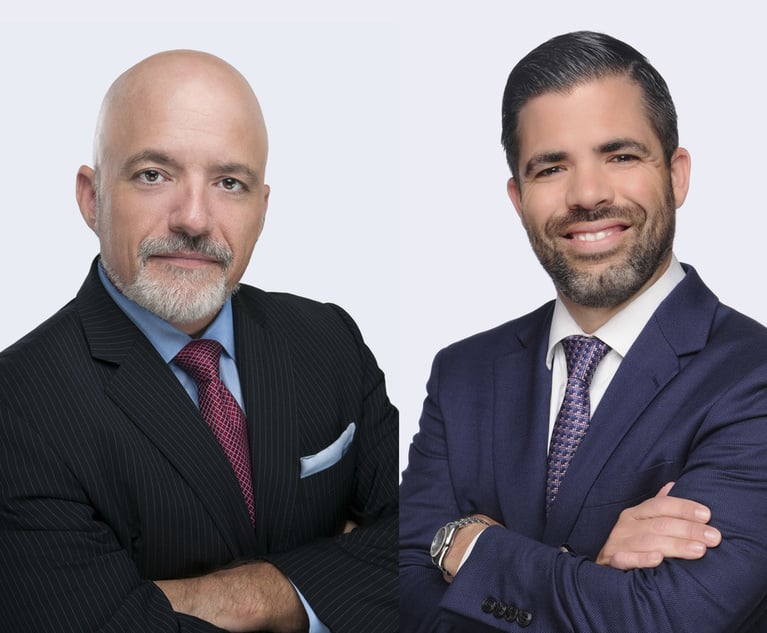Your Professionalism Has Just Been Questioned on Social Media. What Can You Do?
Your law practice generates clients and referrals on social media. Other attorneys speak highly of you on LinkedIn, and you rate a perfect five stars on Avvo.
November 14, 2018 at 09:37 AM
5 minute read
 Don Silver, COO of BoardroomPR.
Don Silver, COO of BoardroomPR.Your law practice generates clients and referrals on social media. Other attorneys speak highly of you on LinkedIn, and you rate a perfect five stars on Avvo.
And then someone writes a negative review. Whether it's on Google or a similar directory, there's a stain on your reputation. What can you, as managing partner or firm administrator, do about it?
The good news is that you saw it as soon as it was posted. Constant monitoring of your law firm's reputation is essential to a healthy online presence. For most social media, including Google reviews, a daily check suffices.
On Twitter, where updates happen in a matter of seconds, you must log in several times a day. Some large practices have people devoted to watching the account every moment during business hours and on weekends because people on that platform are accustomed to instantaneous responses.
When you see a negative review, do not become emotional. Rage against the person who posted or fear that the negative comment will go viral are not productive feelings. Read and re-read the review until you understand it, research the complaint and develop a planned response.
Here's what you must do:
Answer right away. Post a note in 24 to 48 hours. When people go public with complaints, they want to be heard—and quick. Your note can be as short as: “Thank you for bringing this to our attention. We take every client matter seriously and will work to resolve yours with haste.” Even if you can't do that immediately, show that you care by acknowledging the review. That leads to the second point …
Offer to make it right. A proposed solution can take many forms, each of which depends on the client's situation. A positive gesture can go a long way toward defusing the reviewer's feelings of anger or disappointment. To do that …
Take the conversation private. Lift a page from the communications playbook of major brands and ask the reviewer to discuss the matter with you via a provided email or telephone number, or via private message. That elevates the seriousness of your response while taking it out of the limelight. It's easier to work out a problem when others cannot comment online or share the conversation through a repost.
When responding, be authentic and conversational. Avoid writing like an attorney or a marketer, such as “We serve all clients with the same high quality for which our firm has long been known.” Write the same way you would speak to the person on the phone or in person.
Don't argue. You might be innocent from a legal standpoint, but in the court of public opinion you will be found guilty of indifference or worse. Statements such as, “I am sorry that you don't understand how the law works,” are condescending.
Be succinct. Your law practice's difficulties are not someone else's problems. Thus, don't make excuses. No one cares whether a paralegal forgot to check the court docket. Admit being wrong without details that make you look incompetent, such as losing track of a document for a few days. Acknowledge that you didn't perform at your best and move on.
Take the high road. The post may be rude, crude and false. Do not respond in kind. Act in a professional, polite manner for the sake of your colleagues and everyone who clicks on the zero-star and one-star ratings. Express sympathy: “I am sorry that you were not happy with the outcome of your case.” The people reading your answer will see that you are not as bad as the review suggests. They may even think it's a fake review. If you do, too, you can …
Report suspicious posts, especially from someone you don't know. Google has a procedure for notifying it of a review that may be spam or designed to harm a business's reputation. So do Yelp and Avvo. Like you, they want honest critiques. However, they may decide that a post doesn't violate their terms and leave it up there, no matter how false the claim.
Is that it? No, you can do more even if you think that the reviewer is not worth the time, will be more combative when directly addressed, or might take a private conversation public with more disparaging remarks.
Turn the negative into a positive. The best outcome is that your legal practice not only makes the client happy, the person posts a follow-up review telling how pleased he or she is. That's one of the best posts because it shows that when your firm makes a mistake, it acknowledges and corrects it in such a way that the client says, “Wow!”
Most important is to have the proper online monitoring tools working for you. Google Alerts can be set up on the name of your firm and key attorneys as well as other social listening applications. Lexis Nexis is also effective. Make this a priority. Your reputation is your most important asset, and it must be protected.
Don Silver is COO of Boardroom Communications, a Florida PR and integrated marketing agency. He co-leads the firm's crisis communications and online reputation management practice group. Contact him at [email protected].
This content has been archived. It is available through our partners, LexisNexis® and Bloomberg Law.
To view this content, please continue to their sites.
Not a Lexis Subscriber?
Subscribe Now
Not a Bloomberg Law Subscriber?
Subscribe Now
NOT FOR REPRINT
© 2025 ALM Global, LLC, All Rights Reserved. Request academic re-use from www.copyright.com. All other uses, submit a request to [email protected]. For more information visit Asset & Logo Licensing.
You Might Like
View All
Trending Issues in Florida Construction Law That Attorneys Need to Be Aware Of
6 minute read


Trending Stories
Who Got The Work
J. Brugh Lower of Gibbons has entered an appearance for industrial equipment supplier Devco Corporation in a pending trademark infringement lawsuit. The suit, accusing the defendant of selling knock-off Graco products, was filed Dec. 18 in New Jersey District Court by Rivkin Radler on behalf of Graco Inc. and Graco Minnesota. The case, assigned to U.S. District Judge Zahid N. Quraishi, is 3:24-cv-11294, Graco Inc. et al v. Devco Corporation.
Who Got The Work
Rebecca Maller-Stein and Kent A. Yalowitz of Arnold & Porter Kaye Scholer have entered their appearances for Hanaco Venture Capital and its executives, Lior Prosor and David Frankel, in a pending securities lawsuit. The action, filed on Dec. 24 in New York Southern District Court by Zell, Aron & Co. on behalf of Goldeneye Advisors, accuses the defendants of negligently and fraudulently managing the plaintiff's $1 million investment. The case, assigned to U.S. District Judge Vernon S. Broderick, is 1:24-cv-09918, Goldeneye Advisors, LLC v. Hanaco Venture Capital, Ltd. et al.
Who Got The Work
Attorneys from A&O Shearman has stepped in as defense counsel for Toronto-Dominion Bank and other defendants in a pending securities class action. The suit, filed Dec. 11 in New York Southern District Court by Bleichmar Fonti & Auld, accuses the defendants of concealing the bank's 'pervasive' deficiencies in regards to its compliance with the Bank Secrecy Act and the quality of its anti-money laundering controls. The case, assigned to U.S. District Judge Arun Subramanian, is 1:24-cv-09445, Gonzalez v. The Toronto-Dominion Bank et al.
Who Got The Work
Crown Castle International, a Pennsylvania company providing shared communications infrastructure, has turned to Luke D. Wolf of Gordon Rees Scully Mansukhani to fend off a pending breach-of-contract lawsuit. The court action, filed Nov. 25 in Michigan Eastern District Court by Hooper Hathaway PC on behalf of The Town Residences LLC, accuses Crown Castle of failing to transfer approximately $30,000 in utility payments from T-Mobile in breach of a roof-top lease and assignment agreement. The case, assigned to U.S. District Judge Susan K. Declercq, is 2:24-cv-13131, The Town Residences LLC v. T-Mobile US, Inc. et al.
Who Got The Work
Wilfred P. Coronato and Daniel M. Schwartz of McCarter & English have stepped in as defense counsel to Electrolux Home Products Inc. in a pending product liability lawsuit. The court action, filed Nov. 26 in New York Eastern District Court by Poulos Lopiccolo PC and Nagel Rice LLP on behalf of David Stern, alleges that the defendant's refrigerators’ drawers and shelving repeatedly break and fall apart within months after purchase. The case, assigned to U.S. District Judge Joan M. Azrack, is 2:24-cv-08204, Stern v. Electrolux Home Products, Inc.
Featured Firms
Law Offices of Gary Martin Hays & Associates, P.C.
(470) 294-1674
Law Offices of Mark E. Salomone
(857) 444-6468
Smith & Hassler
(713) 739-1250






